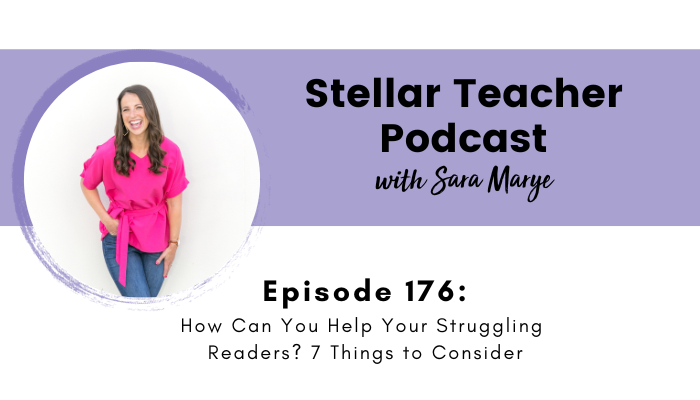
Click play below to hear 7 attributes on how to help struggling readers:
As we start the new year, I want to focus on ways that I can help you with anything your students might be struggling with and provide you with support, resources, and strategies. And today’s topic is something that I think all literacy elementary teachers will resonate with, which is how to help struggling readers in your classroom. While this can be an overwhelming idea because there are so many elements to it, I’m going to make it more manageable for you. So in today’s episode, I’m sharing 7 things you need to consider when trying to figure out how to help struggling readers.
We all want students to be successful and lifelong readers, but that can be a challenge when a student struggles in that area. With there being 7 attributes to reading, it can be difficult to pinpoint the exact roadblock students are facing when it comes to reading. Therefore, I break down each of the 7 attributes, along with questions to ask yourself, a brief explanation of each attribute, and basic intervention ideas.
No matter what grade level you teach, you will have at least one, if not multiple, students who struggle with reading. However, knowing how to correctly identify their challenge with reading will allow you to give students the best strategies to make them successful and grow as readers. So, if you’re looking for ways to help struggling readers in your classroom, this episode is for you!
In this episode on how to help struggling readers, I share:
- 7 attributes of reading, along with a brief explanation of each and qualities a student would embody with that attribute
- 7 questions to ask yourself regarding each attribute and basic intervention ideas
- The one attribute you’d normally try first, but is actually the last attribute to access
- How each reading attribute is connected to each other
Resources:
- Sign up for my Private Podcast: Confident Writer Systems Series
- Check out the Stellar Literacy Collective Membership
- If you’re enjoying this podcast, please leave a review on Apple Podcasts!
Related episodes and blog posts:
- Episode 143, Use a Semantic Map [Small Steps to S.O.R. Part 4]
- Episode 137, Build and Activate Background Knowledge [Small Steps to S.O.R. Part 1]
- Episode 68, 4 Tips for Making Greek and Latin Root Words a Focus in Your Classroom
- Episode 40, 10 Fast and Furious Tips to Tackle Vocabulary Instruction
- Episode 34, Setting Effective Student Reading Goals
- Episode 2, How to Create a Classroom Community That Loves Reading
- 7 Key Attributes of Successful Readers
Connect with me:
- Join my newsletter
- Shop my TPT store here
- Instagram: @thestellarteachercompany
- Facebook: The Stellar Teacher Company
More About Stellar Teacher Podcast:
Welcome to the Stellar Teacher Podcast! We believe teaching literacy is a skill. It takes a lot of time, practice, and effort to be good at it. This podcast will show you how to level up your literacy instruction and make a massive impact on your students, all while having a little fun!
Your host, Sara Marye, is a literacy specialist passionate about helping elementary teachers around the world pass on their love of reading to their students. She has over a decade of experience working as a classroom teacher and school administrator. Sara has made it her mission to create high-quality, no-fluff resources and lesson ideas that are both meaningful and engaging for young readers.
Each week, Sara and her guests will share their knowledge, tips, and tricks so that you can feel confident in your ability to transform your students into life-long readers.
Tune in on your favorite podcast platform: Apple, Google, Amazon, Spotify, Castbox, and more! If you’re loving this podcast, please rate, review, and follow!
Podcast (stellar-teacher-podcast): Play in new window | Download
Hey, there, it’s Sara Marye, your host for the Stellar Teacher Podcast. And as always, thank you for tuning in and listening each week. I know I say this often. But really, I appreciate you guys so much, I just have so much fun putting these episodes together for you. And it means the world to me to know that you are tuning in and listening and hopefully finding some encouragement and inspiration for your classroom instruction this week.
Today, we are going to talk about a topic that I bet you will be able to resonate with. And that is what to do when we have a student who struggles with reading. And I’m curious and raise your hand if you have had students in your class either this year or in the past, who struggle with reading.
Now I want you to think about that student, you know whether you’re picturing a student or group of students, I want you to think about what was it that was preventing that student from being a successful reader? And I would love for you to tell me like seriously right now say it out loud, what is it that makes it students struggle or that caused that students who struggle with reading?
And while I cannot hear exactly what it is that you said, obviously, what I can guarantee is that every single one of you just said something completely different.
And maybe it is that you have a student that struggles with vocabulary, and having the background knowledge that is necessary for them to access and understand the text. Or maybe you have a student that you know, they’re a rock star reader, and they can read every single word correctly and beautifully and fluently. But they have no idea what it is that they said when they finish reading something they are clueless.
And maybe you have a student that is also, you know, a rockstar reader. And they’re, you know, really smart, and they do well in all of their other subjects. You know, they’re great with math and science and social studies and writing. But they’re not motivated, and they’re apathetic when it comes to reading, they’re just bored with it. Maybe you have a student that sounds like a robot, no matter how many reader feeders you do, they still sound like a robot.
You know and here’s the really sad and unfortunate thing that it is quite possible that even though you teach third, fourth or fifth grade, that you still have students that actually cannot read or decode the text they are given. They just they don’t know the words, they cannot sound them out, they don’t have the tools to actually read.
And maybe if you’re lucky or extremely experienced and have been in the classroom for a long time, you have experienced all of these, or you currently are experiencing all of these plus so many other things, so many other hurdles that I didn’t even mention, these are just a few examples that I personally have experienced when I was in the classroom.
And here’s the thing that I think is important to consider is that each of these readers that I described in these scenarios, they could be considered a struggling reader, they are all struggling with some aspect of reading. And I think so often, we only think about students that struggle with reading when they aren’t successful on a standardized test. But standardized tests have nothing to do with what we want for our students as readers.
You know, I think it’s important to pay attention to the students who lack interest and motivation or lack background knowledge. They shouldn’t be just as much of a concern for us as reading teachers as the students who struggle with accuracy or fluency. And the reason for that is because I know, we want all of our students to be successful, and fall in love with reading and become lifelong learners.
And because we want all of our students to be successful with reading, we need to be prepared to support and encourage them and teach them no matter what challenge or roadblock they are currently facing when it comes to reading.
Which is why when we notice a student is not being successful in reading, and they are struggling with some aspect of reading, we need to kind of pause and consider seven things you know, that we need to pay attention to. There’s this idea of there’s really like seven attributes of reading there’s this list or ladder of you know what it means to be a successful reader and we need to stop and run through that list.
Okay, what is it what challenge what roadblock what hurdle are they currently facing that is preventing them from being a successful reader? So, today I’m going to share with you basically seven questions to ask that will help you kind of like, identify which specific attribute they are struggling with. And then I’m going to share some very basic intervention ideas that you can apply to your students that will hopefully help them overcome that specific hurdle or roadblock and continue growing as a reader.
First of all, let me just tell you, there’s a lot of information that I have in this podcast. And I always want to make it easy for you to remember and apply it in your classrooms. So I put together a cheat sheet for you that you can grab in the show notes, I wanted to make sure that you can remember all of the different attributes that I cover and all the intervention ideas that I share. So be sure to grab that when you’re done listening.
And then also, everything that I shared today is really just kind of like the tip of the iceberg. Each one of these ideas or you know, attributes, questions and intervention ideas can become an entire podcast episode on their own. So if after listening to this podcast, you have specific questions about any one of these attributes, and you want me to go more in depth, you know, I love hearing from you and I love putting together episodes based off of listener requests.
So reach out to me on Instagram at @thestellarteachercompany, took me a minute to remember what my handle is at @thestellarteachercompany. And I would be happy to either go in depth a little bit more or put together blog posts or podcasts to answer any questions that you have. So just wanted to put that out there. But be sure to grab the cheat sheet in the show notes after the episode.
And let’s go ahead and jump right in. So the very first thing you need to consider if you have a student who is struggling with reading is accuracy. And basically what you’re going to do is you need to ask the question, can this student actually read the text.
And when we think about accuracy, accuracy is the ability to actually read the words and the text accurately and correctly. And accuracy is, you know, it is the starting point it is the foundation of reading, which is why this is the very first thing we need to consider. A break in accuracy is going to lead to a break and comprehension it is going to impact every other part of reading. And so it really is important that students have the tools necessary to be able to quickly and fluently and automatically decode that means to be able to read unfamiliar words.
And so what we want our students to have is we want our students to have the qualities of a student who reads with accuracy. So if a student has accuracy, they are going to be able to read words smoothly without stumbling over the words, they are going to read automatically, they’re rarely going to have to stop to decode words meaning they don’t have to sound out the words they you know, they know how to break up the word into syllables correctly.
They know the word families they know roots and prefixes and suffixes. They can use word parts to mentally decode and it all is automatic. Now, like I said, this is the very first thing we need to pay attention to because if a student does not have accuracy, it’s the first thing we need to address.
So if you do have a student and this definitely happens in upper elementary, if you have a student who struggles with accuracy, we need to basically pinpoint what their hang up is, do they struggle with syllabication? Do they struggle with reading prefixes and suffixes correctly?
You know, for example, a lot of times the word -ed at the end of word can either be ed de, and sometimes, you know, students will read the word walkin, if they see you know, the word walked, it ends in the sound. But if students think ed always says Ed, they’ll say walk ed.
So pay attention to how students are reading the words, is it a prefix or suffix issue. Maybe it’s a vowel pattern, maybe they don’t understand complex vowel patterns, you know, word families, and so be able to pinpoint the specific hang up and then you’re going to want to provide explicit instruction for that specific challenge.
So whatever it is, and the three that I just listed are the tip of the iceberg. There are so many other you know, accuracy elements, but provide explicit instruction. That means you might need to pull students for like a small group. If you’re an upper elementary and using strategy groups, you can pull a strategy group for accuracy, you could pull a strategy group to teach prefixes suffixes.
You know vowel patterns, provide students with anchor charts that have the phonics rules, give them practice with decodable text. So if you are practicing suffixes, give them decodable texts that have lots of words that end in that suffix, if you’re looking at vowel patterns, provide decodable texts that have words with that vowel patterns, so they can practice correctly and automatically reading those words.
You know, I think an upper elementary like I said, the sad thing is, is you will have students that struggle with accuracy, but even if they don’t on a sort of normal basis, the the grade level expectation, things that we should focus on on a regular basis are prioritizing Greek and Latin root words as well as affixes. So those prefixes and suffixes and you know, making sure that when students see those things that they are able to accurately read those words. So, first thing we need to address is accuracy.
The second thing once we know our student, for sure is an accurate reader, then we need to look at fluency. So the next question you can ask is can the student read the text smoothly and at an appropriate pace?
And when we think about fluency fluency is the ability really to read at a conversational rate with both accuracy and expression, you know, we want students to read so it sounds like they are talking. I’m sure you’ve seen students in the past where they either read like a robot where everything is very choppy, or they don’t pay attention to punctuation and everything, it sounds like one giant run on sentence. Those are obviously you know, sort of signs to you as the teacher that your student might struggling with fluency.
And, you know, fluency is really important to pay attention to because there is a high connection between fluency and comprehension, what you’re gonna notice is there’s a connection between all of these elements, and then we’re talking about but if a student is not a fluent reader, you know, that means if they are choppy, if they’re robotic, if they you know, don’t read with a correct pace or expression.
More than likely, that means that they are probably focusing the majority of their energy on actually being able to decode the words, and not thinking about how they all string together to form a complete thought or an idea. So they’re going to miss out on the comprehension element of it.
And so fluency is definitely one of those things that we want to make sure our students are fluent readers. So qualities of a student who do read fluently, these are kind of the things that you want your students to have in place, we want them to be able to pause at commas, you know, to stop briefly at the end of sentences, not necessarily just the line, I remember seeing that a lot when I was a second grade teacher, students would want to stop thinking the sentence ended at the end of every line in the text but actually paying attention to punctuation.
We also want to make sure students have a change in volume and tone and that you know, there’s an appropriate voice, we want our students to be able to read naturally and smoothly again, this conversational element, and we want students to be able to read at an appropriate pace. And you know, that means not too fast and not too slow. So these are all of the things that we want to look for, to make sure that fluency is in place.
Now, if you notice that a student struggles with fluency, there are definitely things that you can do. I think one of the most, you know, powerful things is the idea of like a repeated reading, you know, letting students practice reading a text until they can become fluent with it.
Poetry is a great way in upper elementary, because poems are relatively short, you know, students can practice reading poems over and over again, relatively, you know, in a short timeframe, and that repeated reading can help them also doing readers theater can help with the conversational element, but also having students listen to audiobooks so that way they can hear fluency, you know, if they can listen to an audio book and read along in the actual text, that’s going to help them just hear what a fluent reader sounds like.
But then another thing you could do is have students record and listen to themselves. You know, I think if students can hear how they sound as a reader, it’s like, wait a minute, that’s not what I sounded like in my head, that can also help them just be aware of, you know, things that they can improve with their own fluency. So fluency is the next thing we need to make sure is in place.
And then once you know for sure that your students are both accurate readers, and fluent readers, then you want to think about this idea of efficacy. And efficacy is basically does the student believe they can be a successful reader?
You know, efficacy refers to whether or not a student has confidence in their ability to be a successful reader. You know, regardless, I think of a student’s reading ability, we want them to have this innate sense that yes, I am a reader, I can be a successful reader. It’s really like the growth mindset for reading. And this is something that we want all our students to have, if a student struggles with reading, we want to make sure that it’s not necessarily a mindset issue.
And so students that do have efficacy, they don’t shy away from reading experiences, they’re not going to get frustrated or give up if they encounter difficulty, because they know that at some point, all readers struggle, you know, and they power through with that they don’t view a test failure as a direct reflection of their, you know, ability to read.
Students with efficacy can persevere through long, complex texts without getting fatigued, you know, they’re willing to explore new reading experiences, and understand that everything they read is just going to help them to grow as readers. And again, it’s really like this growth mindset for reading.
And so if you notice, you have a student and I can think of several fourth graders that I had, that they they were accurate readers, they were fluent readers, they understood what they could read. But they had this almost like identity issue that they were like, Oh my gosh, I’m not a good reader. I’m struggling with reading. And I think it’s important to make sure that our students have this belief that they can be a strong reader.
And so a couple things that you can do. I think first thing is to celebrate the reading habits and behaviors a student does do well, not their success. We are not talking about how they do on standardized tests. We’re not talking about you know how they respond to reading quizzes. We’re not talking about how they answer comprehension questions.
We are simply celebrating the fact that they are reading every day, that they are trying new books that they’re exploring genres, you know, whatever it is, whatever their habits are, we celebrate the habit and the process of reading. We want to focus on their achievements that have nothing to do with academic mastery.
Maybe they explored a new genre, maybe they read an entire book series, you know, maybe they participated in a book club discussion for the first time, and they share their opinions and ideas, we want to celebrate those achievements, not anything that has to do with academic mastery.
You know, we want to promote a growth mindset, specifically around reading in our classroom just in, you know, whole group conversations and our morning meetings, when we’re having conferences, you know, celebrating this idea that we are all readers that we are all growing as reading that we’re all exploring new things that we all have the ability to be a reader and just encourage this growth mindset around trying new things in reading.
And then I think it’s also really important, especially in upper elementary, try to remove the pressure of state testing. And I think separating state testing from a student’s reading identity or their success or experience with reading. And sometimes I think, because we over test our students that is hard to do, but I think reminding them that how they perform on a multiple choice standardized test has nothing to do with their personal identity, enjoyment pursuit of reading.
But efficacy is definitely something we need to pay attention to. If a student is struggling with reading, we need to make sure that they actually see themselves as being a reader and that they can be successful and have a successful reading life outside of school.
Okay, so the next thing we need to pay attention to is interest. And we need to ask ourselves, Is the student personally interested in the text they are reading? And interest really refers to whether or not students have a personal passion or excitement for the text that they’re reading.
You know, do they care about reading on a personal level, you know, students who are interested in reading they know, and they understand how to read for enjoyment. They know how reading can help them learn more about topics that they are personally interested. Oftentimes students that are interested, they’re going to have a strong reading identity. They know their favorite genres, they know their favorite topics, they have a list of favorite authors, you know, they don’t view reading as homework.
These are the students that when you say, Okay, it’s time for independent reading, they get excited. They’re the students that come in and tell you about the books that they’re reading at home. These are the kids that anytime you have an extra 10 minutes or free choice, or they finish an assignment early, they pull out a book, and they have sort of their own strong reading identity.
They know what they want to read, they’re eager to finish chapter books, once they start them. They love participating in book clubs and read alouds. And just any discussion centered around a text, these are the students that have that personal interest in reading.
And I think unfortunately, sometimes because of issues either with accuracy or fluency, or when students are sort of beat down with over testing, there can be a lot of students that don’t show an interest in reading. And so more than likely you have students in your class that they say they don’t enjoy reading.
And so a couple of things that you can do, if a student does not show interest in reading, you can I think, try to give them a reading inventory that is going to help them identify genres and topics they like to read.
And I do have a freebie it is one of my favorite freebies. It is like a choose your own reading experience. It’s a reading inventory that basically guides students through asking questions about what they enjoy reading about the types of reading experiences they like to have, and then it helps them identify their favorite reading genres, I will link to that in the show notes as well definitely grab that, because that can be a helpful tool in helping students identify their interest.
But I think also helping students to recall positive reading experiences they have had in the past, maybe they’ve listened to an audio book, maybe they’ve listened to a read aloud that they enjoyed into a past, even if it is they’ve watched a movie that is based on a book start with that, if that helps students create this positive thought around reading, you know, do they have a favorite picture book from their childhood?
I think oftentimes, kids say something like, I don’t like reading. But what they really mean is that they don’t like the way reading is taught in school. You know, they don’t like having a reading textbook. They don’t like reading long reading passages. They don’t like multiple choice reading tests. You know, it really has nothing to do with the fact that they don’t like reading. It’s the fact that we’ve really institutionalized reading in schools.
And so again, I think it’s so important to help students realize that reading, there’s this whole element of reading that has nothing to do with how reading is taught in schools, and we want students to be able to tap into that. So I think helping students develop an interest is so important.
You know, you can help students identify authors and genres and topics that they enjoy reading. So when they go to the library, they have a list of books of genres of authors that they know exactly what it is that they’re looking for.
And then I think it’s also important, you know, to some degree, letting students self select not only the text, but the format of texts they enjoy experiencing. If you have a student who loves listening to audiobooks, let them listen to an audiobook. If they like watching the YouTube video of somebody reading a book, let them watch that YouTube video, we want students to have that interest in reading, which means we need to let their personal preferences guide their reading experiences.
So interest is an important part of being a successful reader. And it’s something that we definitely need to sort of question wonder and pay attention to. All right.
The next thing we need to consider if a student struggles with reading is motivation. You know, is the student motivated to engage and participate in reading activities?
And oftentimes, I feel like motivation and interest go hand in hand. And sometimes we kind of talk about them, like on the same level. But reading motivation really is a little bit different than interest. It’s almost like the application and follow through of the interest. You know, reading motivation kind of focuses more on a student’s willingness, their eagerness or their readiness to actually participate in a reading experience.
You could have a student who is interested in reading historical fiction, and they know that that is a genre or a topic that they are interested in. But if they aren’t eager to actually read the text, you know, if they aren’t willing to participate in the reading experience, then their interest really isn’t serving them for this particular instance. So once we know students have interests, we got to make sure that they’re motivated to pursue reading about their interests.
If students are motivated, these are basically things that you’re looking for, if a student is motivated to read, they’re going to have a strong sense of purpose for their reading experiences, you know, they’re going to be willing and excited to explore new texts, they’re going to act on their own curiosity to pursue topics or genres to read, they’re going to follow through and actually read the texts on their interests list.
So like I said, it’s kind of like the application of their interests, and they’re going to actively participate in class reading projects, they aren’t going to complete assignments, they aren’t going to, you know, participate in the discussions, they are going to actually follow through on the reading experiences, because they are motivated.
So if you notice a student is struggling with motivation, we want to help give them purpose for their reading, we want to give them a reason to engage in reading. So it’s all about how can we create, you know, I don’t want to say urgency, necessarily, but I think it really comes down to purpose. How can we make sure that they feel like this reading experience is purposeful?
So a couple things that you can do are, you know, make sure students have a personal reading goal that they are working towards. And we’re not talking about reading levels or mastery on a state test, maybe we’re talking about a certain number of books that they want to read during the year, or a certain series that they’re trying to get through.
Or maybe you do, you know, different reading challenges like, you know, a poetry challenge or a picture book challenge or genre challenge. Those are some of my favorites. And so they have this challenge, this personal goal that they’re trying to accomplish.
I think incorporating things like genre studies, author studies, inspired action, research projects, and other project based reading assignments, can help give a strong purpose for reading because all of a sudden, it’s not I’m trying to read this book, or I’m reading this passage, I’m responding to these questions. It’s like, No, we’re studying this genre, we are learning more about this author, you know, we’re taking action based off of what we’ve read, we are researching this topic. And it creates just a little bit more purpose for reading, other than just today read for 20 minutes, or whatever it is.
And then I think another thing that can really help with motivation is this sense of community and collaboration. I think if you can make readings such an essential and key part of your classroom culture, it is going to naturally create the motivation. And so I think it’s important to let students collaborate during reading.
This means letting them buddy read, let them participate in book clubs, let them give a book, talk to their classmates, you know, let them answer questions and work on assignments together, I think anything else that is going to help them feel connected to the reading that is happening in the classroom is going to motivate them to want to be a part of this larger reading community. So those are just a few things that you can do if you notice a student is struggling with motivation.
Okay, the next thing is so important, and it is background knowledge. And so we need to ask ourselves, does the student have sufficient background knowledge to understand the topic that they are reading?
Background knowledge is so essential to any reading experience we want our students participate in. And the challenging thing is, it is so extremely personal and something that is kind of out of our control as teachers. You know, background knowledge refers to the information or understanding a reader already has about a topic.
And I think the thing to kind of understand is that background knowledge can cause anybody to be a struggling reader, you know, anyone can struggle given the right text. I think so often, we only think of struggling readers as those who struggle with accuracy, you know, or fluency or something like that. But background knowledge can really be the one thing that prevents a student from understanding what they are reading.
And if I think about my own personal reading experience, if you would put a complex medical journal in front of me I would be lost. And that is not because I’m not a good reader. I know I’m a good reader. I know that I have accuracy and fluency and I’m interested in motivated I got all of these things, but because I don’t have sufficient background knowledge on any medical topic at all, I would struggle to understand and recall and be successful. experiencing that text.
And I think that like background knowledge is one of the trickiest things that we have to deal with as reading teachers. Because we cannot control the amount of background knowledge that our students do or do not have, you know, even in your classroom, all of the topics that you read about each individual student is going to have a different amount of background knowledge on those topics.
And you could have a student who has great accuracy, fluency, they’re interested, they’re motivated, they have the efficacy. But if you put a text in front of them, that they have zero background knowledge on on that topic, more than likely, they’re going to feel like a failure as a reader, because they did not understand that text. And especially if there is some sort of assessment attached to it, they’re going to forget all of the wonderful things that they do have going for them as readers, and they’re going to just let that one reading experience. I don’t wanna say destroy them, but it could really discourage them.
You know, so I think paying attention to background knowledge is really important. And, again, part of the reason why it is so important is because when readers do have background knowledge, when we have some understanding of what we are reading, we are able to make connections between what we are reading and something that we’ve already read or learned.
You know, we are able to communicate the big ideas in a text, we are competent in what we are reading, because we have some experience or knowledge about the topic or you know, situation in the text. And ultimately, the background knowledge allows us to remember the things that we have read because we have this little filing system in our brains that we are able to connect the new information to.
So background knowledge is obviously important. But it’s also not necessarily something that we can teach because there’s so much of it. And it’s so varied. And we don’t always know what our students don’t know.
But there are definitely things that we can do to be intentional about activating background knowledge as well as building background knowledge and our students. And I think one of the most important things is focusing on vocabulary, both supporting, you know, giving students the tools to support and understand vocabulary that is specific to the text, but also regularly incorporating routines and procedures that will help students build vocabulary for future reading experiences.
You know, I’ve talked about these things before, but Greek and Latin roots, you know, making sure students know how to use context clues, making sure that they know how to use text features to figure out content specific words. And I think even highlighting content specific vocabulary during your reading experiences.
I also think that we can be intentional about building background knowledge before any content specific unit, you know, so if you’re teaching in science or social studies, let’s say you’re getting ready to teach a unit on westward expansion in social studies, you know, before that unit, maybe during your reading lessons, you read some historical fiction texts and expose students to some of the ideas or timeframes or locations that they might learn about and their social studies unit.
So that way, it’s like, oh, yeah, and that story, we read about the same thing. And now I’m going to learn more in depth actual facts and information about this topic.
I also think incorporating thematic planning can be really helpful with background knowledge, because basically, you’re going to be connecting what you are reading to, either you know, what you are teaching in science, or social studies, and you’re reading multiple texts about the topic.
Or even if it is just if you are not a science or social studies reader, then think about how can I teach thematic units in my reading block and picking you know, a topic and reading multiple texts on the same topic, so that way, every time students read, they’re just adding and connecting back to their previous reading experiences.
Also, helping students be able to create concept maps while they are reading. So that way, they can keep track of concepts and ideas that are presented in the text, especially if it’s a text that they are unfamiliar with. So making sure students can create graphic organizers to organize their thinking.
And then I think giving students question stems that will help them access their background knowledge. And three of my favorite questions to ask students is, what do you think you know about the topic? Not necessarily what you do know? But what do you think, you know, it removes some of the pressure.
What does the author expect you to know about the topic? And this can be really helpful, because if they realize that the author expects me to know, you know, this vocabulary word or this event, even if they don’t know it, they can realize that it’s like, okay, this background knowledge will help me understand it. Let me go research that topic a little bit more or understand this word before I read it. So understanding the author’s expectations.
And then, if you were someone who didn’t know about this topic, what might you say? And again, just to help you in students to try to access as much as they possibly do know, even if it’s very little, you know, even if it is, you know, something small about the topic, they’ve heard about it before, you know, having them really just almost like a risk free opportunity to share whatever information they have about a topic or genre or an author. So those are some questions that you can ask, to hopefully help students activate background knowledge.
And then the final thing, the very final thing, and sometimes I think in upper elementary, this is the first thing that we try to address when a student is struggling with reading, but honestly, this should be the last thing that we consider and that is comprehension. And so the final thing we ask when a student is struggling with reading is does the student actually understand and remember what they are reading.
And simply put comprehension is the student’s ability to understand what they are reading. So in order for students to do that, hopefully you can kind of see, they need to have all of these other attributes in place, they need to be an accurate reader, they need to be a fluent reader, they need to have efficacy, they need to be interested, they need to be motivated, and they need to have a certain amount of background knowledge.
And when all of these other attributes are in place, your students then are set up to be successful with comprehension. So a reader who can comprehend what they read, they can easily recall and retell details from the story, they can actively and easily participate in discussions about a text, they can form their own opinions and share their own thoughts about what they have read, because they fully understand it, you know, and they can successfully write and respond to reading in a variety of ways.
Now, here’s the thing, even though this is the last thing we consider, you might have students that just struggle with comprehension, everything else might be in place, but they still might struggle with comprehension. So there are definitely some interventions that you can put in place.
Very first thing, they’ll make sure you’ve eliminated every other issue before you address comprehension. But if it is an indeed a comprehension issue, a couple things that you could do are incorporate strategy groups into your reading block to provide targeted instruction when students struggle with a comprehension skill.
So basically, you’re providing support, you know, whether it’s asking questions, making connections, making inferences, you know, using context clues, you’re going to provide target instruction for whatever the missing comprehension skill is.
I think teaching students a variety of comprehension strategies and letting them choose which ones they use, you know, helping students figure out what comprehension strategies work best for them, knowing that that is going to be personal for every student.
I think helping students or having students share their understanding orally, before they communicate their understanding in writing, a lot of times we assess a student’s comprehension based off of some sort of written issue. But sometimes writing might be the challenge. And it’s not comprehension. So if students can share their understanding orally, before they write it that can help you make sure that they actually have strong comprehension.
And I think as teachers, it’s important to think about comprehension beyond the multiple choice tests are looking for just a single correct answer, knowing that, you know, comprehension has a lot to do with our personal interpretation, which again, is going to be different from student to student. So just being open to this idea that an answer key is not always going to be evidence of comprehension. So hopefully, that is helpful.
Now, I know that there was a ton of information for you in this podcast. And like I said it to help you remember, all of these key points, the seven attributes, the questions to ask, as well as the intervention ideas, I did put together a cheat sheet for you. And I will link to it in the show notes. So be sure to grab that I think it is a really helpful little cheat sheet that you can keep in your teacher planner, or somewhere near your reading table.
So that way, if you are like wait, the student is struggling, you can kind of run through these seven elements and really figure out what is it that I need to know where do I need to begin with my intervention, because it might not just be with comprehension, or a strategy group or it might not be with, you know, the interest or the motivation. So hopefully that is helpful. Definitely grab that in the show notes.
And then of course, I hope that this episode helps you feel just a little bit more empowered to support your students who might be struggling with reading. And of course, as always, have a stellar week I cannot wait to connect with you next Monday.

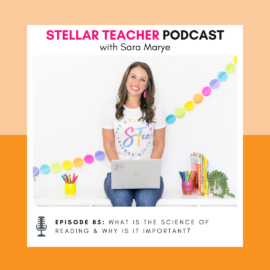
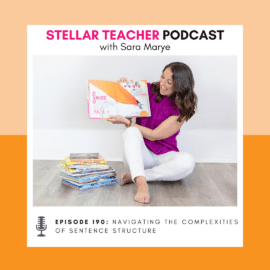
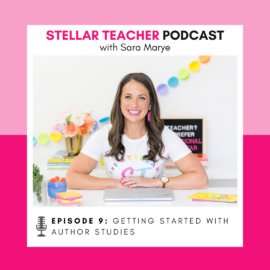
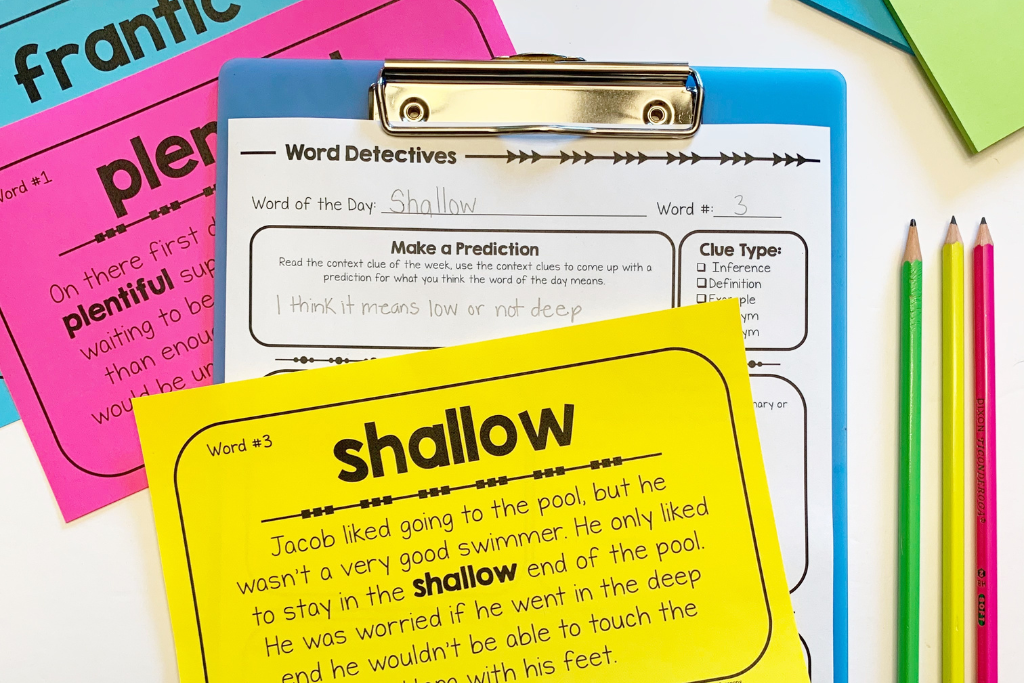

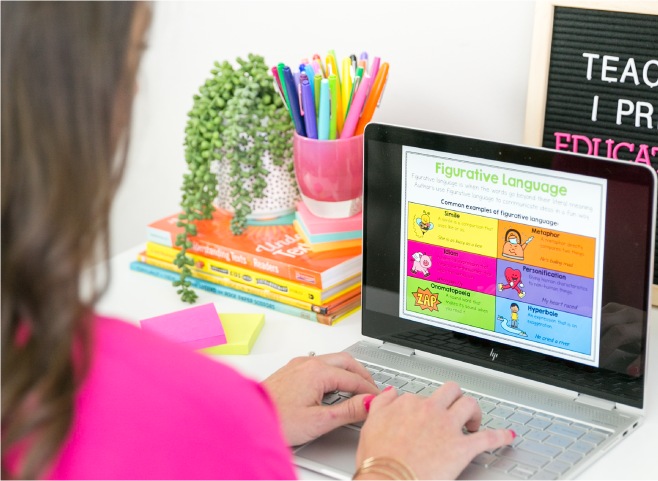

Leave a Comment
You must be logged in to post a comment.